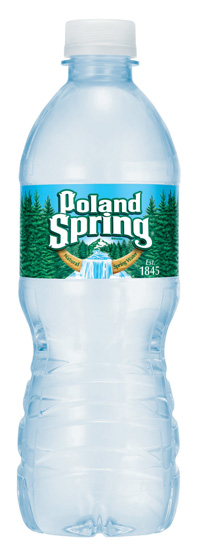Nestle Waters Embraces Natural Business
 During the 1990s, Nestle Waters North America (NWNA) grew aggressively through acquisitions. As the company grew, so did the pressure to fulfill social obligations. Thus, the leadership team created a "culture of values" to live by that are still in tact over a decade later.
During the 1990s, Nestle Waters North America (NWNA) grew aggressively through acquisitions. As the company grew, so did the pressure to fulfill social obligations. Thus, the leadership team created a "culture of values" to live by that are still in tact over a decade later.The Complete Package
NWNA depends on water for its business, so respecting and preserving the natural environment is in its DNA. The company is focused on the three R's:
- Reduce energy and material use
- Reuse left over manufacturing materials
- Recycle materials in plants and empty bottles through advocating for consumer recycling programs
According to Ron Dyer, environmental manager, Poland Spring Brand Natural Spring Water, "Poland Spring is committed to conserving resources and caring for the environment. Reducing the amount of plastic in our half-liter bottle is another big step in our long tradition and track record of environmental stewardship."
"LEEDing" the Way
NWNA does not have a large independent supply chain. Eighty percent of its products are shipped directly from plants to retailers, reducing transportation and facility energy. If NWNA has to use a contract carrier, the company works with the carrier to make the distribution routes as short as possible, leading to a decrease of 31 miles per trip.
Partnerships were formed with retailers, like Wal-Mart, Costco, Target and others, to reduce the number of miles trucks drive without product. These "empty miles" are reduced through coordinating backhaul deliveries.
In 2003, a NWNA plant achieved LEED certification from the U.S. Green Building Council. Today, there are five LEED certified plants across the United States, which have reduced energy use by 1.5 million kWH, emissions by 2.1 million pounds of carbon dioxide, water by 9 million gallons and waste by 216 million pounds.
Ongoing Journey
NWNA Spokesperson Jane Lazgin offers some advice for companies looking to optimize their supply chains with "green" criteria: "We look to partner with the right experts to help us identify opportunities. We also engage suppliers, retail partners, NGOs and community activists, and employees in the process. Most important, however, the commitment needs to be sincere and actions need to be substantial and measurable. Consumers are extremely savvy and it doesn't take long for them to ferret out companies whose promises are empty or whose actions are not authentic."
Lazgin also says that NWNA will continue to look for ways to reduce its environmental footprint because it's an ongoing journey.
